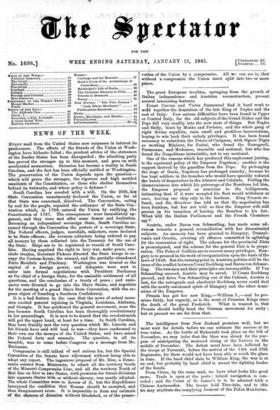NEWS OF THE WEEK.
EVERY mail from the United States now surpasses in interest its predecessor. The efforts of the friends of the Union at Wash-
ington have hitherto failed ; the prudent advice of the statesmen of the Border States has been disregarded ; the attacking party has proved the stronger up to this moment, and goes on with accelerated momentum. Secession has become a reality in South Carolina, and the fact has been officially notified at Washington. The preservation of the Union depends upon the question— which will prove the stronger, the vigorous and high mettled assailants of the Constitution, or those who shelter themselves behind its bulwarks, and whose policy is defence South Carolina has seceded with a will. On the 20th, her State Convention unanimously declared the Union, so far as that State was concerned, dissolved. The Convention, acting by and for the people, repealed the ordinance of the State Con- vention which, in 1788, entered the Union by ratifying, the Constitution of 1787. The consequences were immediately ap- parent, and they were met after' some demur and hesitation. Becoming an independent sovereign State, South Carolina as- sumed through the Convention the powers of a sovereign State. The Federal officers, judges, marshals, collectors, were declared to be State officers ; the revenue collectors being ordered to pay all moneys by them collected into the Treasury for the use of the State. Ships are to be registered as vessels of South Caro- lina. Having acquired the right to levy war, make peace, con- clude treaties, Governor Pickens directed the State troops to oc- cupy the Custom-house, the arsenal, and the partially-abandoned Forts Moultrie and Pinckney. Washington was treated as the capital of a foreign power, and delegates were sent to enter into formal negotiations with President Buchanan as the chief of a foreign State, for the amicable settlement of all questions, and the conclusion of a treaty of peace ; and emis- saries were directed to go into the Slave States, and negotiate for the meeting of a grand Slave State Convention, with the ex- press object of founding a Southern Confederacy.
It is a bad feature in the case that the news of actual seces- sion excited general rejoicing in Virginia, Louisiana, Alabama, and Georgia. It has quickened the general movement, none the less because South Carolina has been thoroughly revolutionary in her proceedings. It is now to be feared that the revolutionists will get the upper hand, at least for a time. In South Carolina, they have frankly met the very question which Mr. Lincoln and his friends have said will lead to war—they have confiscated to their own use the moneys of the United States, and have seized the Federal forts and arsenals. The question, in all its breadth, was to come before Congress on a message from Mr. Buchanan.
Compromise is still talked of and striven for, but the Special Committee of the Senate have adjourned without being able to adopt any report. The ingenious proposal of Mr. Rice, a Demo- cratic senator from Minnesota, to admit all the territory South of the Missouri Compromise Line, and all the territory North of that line en bloc as two States, with provision for future divisions into separate States with or without slavery, was nearly adopted. The whole Committee were in favour of it, but the Republicans interposed the condition that Kansas should be excepted, and then disagreement arose. It is impossible to form any estimate of the chances of disunion without bloodshed, or of the preser-
vation of the -Union by a compromise. All wa can see is, that without a compromise the Union mu3t split into two or more pieces.


























